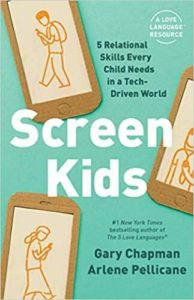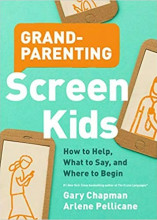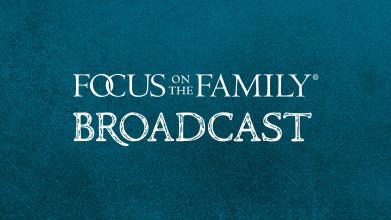Excerpt:
Arlene Pellicane: Day after day, moment after moment, every time your child refers to you, they see that your attention is on a device. They’re going to get that message, as Dr. Chapman has said so well, that device is more important than me. And that’s, you know, there are so many kids, we think it’s the kids that have the problem, but there are so many kids who are like, if my mom or dad would just stop checking email, and I would feel more loved.
End of Excerpt
John Fuller: Well, that’s Arlene Pellicane, and she joins us again today on Focus on the Family. And, uh, she’s joined by Dr. Gary Chapman. We’re going to be talking about screens and kids. Your host is Focus president and author Jim Daly, and I’m John Fuller.
Jim Daly: John, last time we talked about h- how screens and the addiction to screens, especially for our kids, but us, too, as parents, how it’s affecting our families, our household, everything. And I think in this moment, as, uh, you know, we’re coming out of COVID and all those things, there’s just such high use of screen time right now. How do we get control of that? Uh, it’s the number one issue in the Daly household. I don’t know about you.
John: I, I was just thinking about this, Jim. There are screens everywhere. My printer has a screen.
Jim: (laughs)
John: Refrigerators often have screens. Um, uh, I mean, they’re everywhere in the home.
Jim: Yeah.
John: And, and they command our attention.
Jim: And here’s the bottom line. Here at Focus, we want to help you be the best parent you can be. We want to equip you to be a godly parent. And, I think being aware of screen time, usage, etc., the traps that are out there, but also the benefits, I mean, it is something to have the knowledge of the world at your fingertips. And, uh, your kids need to access that information for school, for other things, but how do we find that great balance? And, uh, you know, it’s like anything. I think the printing press was probably seen by some as evil, but there are good things that God will use through it. The same is true with the internet. Uh, there’s many evil things on it, but there are some good things. Bible studies. Uh, you know, Jean has two or three Bible study going online, and I’m sure many of you do, as well. Today, we’re going to cover that topic, continue to cover the topic. If you missed last time, go to the website, get the download, get the smartphone app, whatever you need to do. It was a wonderful conversation that pointed the finger both at parents and then at young people that maybe are spending too much time with their screens.
John: Yeah, and ironically, you just said get the smartphone app, right?
Jim: (laughs) And I mean it. (laughs)
Dr. Gary Chapman: (laughs)
John: We are, we are online. Give us, uh, give us a call, as well. Uh, 800-A-FAMILY, or online at focusonthefamily.com/broadcast. And, as I mentioned, Dr. Gary Chapman and Arlene Pellicane are back with us. And, uh, they’ve written this great book, Screen Kids: 5 Skills Every Child Needs in a Tech-Driven World. And, um, we do encourage you to get a copy of that from us. Dr. Chapman is a pastor, and speaker, and author of the bestselling five love languages books, and Arlene is also a speaker, and author, and wife, and mom of three.
Jim: (laughs) Welcome to both of you. Good to have you back.
Dr. Chapman: Thank you.
Arlene: Great to be with you. I, I wanted to say something about that smart- smartphone thing, app.
Jim: (laughs)
Arlene: So, there’s digital vegetables and digital candy. So, it seems ironic, like, oh, we’re talking about technology, but you’re using technology. Do you feel hypocritical? But all screen time is not equal, and so to realize as a parent, is it something good that’s building my brain, that’s going to help my soul, you know, feed my soul? That’s a digital vegetable. That’s Skyping grandma. That’s online school. No kid is going to get addicted to online school. (laughs)
Jim: (laughs)
Dr. Chapman: (laughs)
Arlene: You don’t have to worry about that. But, it’s the digital candy, it’s the endless YouTube videos, TikTok, Instagram, video games. That’s the stuff that you really want to watch, so all screen time is not equal.
Jim: Mm-hmm (affirmative). Well, and it’s so easy. I, you know, when I go to church, I pull out my phone, not to do email-
Arlene: Right.
Jim: … but to read along with the text that’s being read.
Arlene: Sure you do. No, I’m teasing. (laughs)
Jim: Yeah, but it is. It’s just so convenient. I, I know, even in that camp, there’s going to be people that, “You should bring the book,” but it, the book’s right there.
Dr. Chapman: (laughs)
Jim: (laughs) You could just, like, use your thumb, and there’s the book.
Arlene: Yes.
Jim: You know? But it is all that, uh, tradition versus nontraditional approaches. Uh, let’s do a little recap from last time for the listeners that are just joining today. Uh, let’s describe, and Arlene, I’ll start with you, uh, the impact technology and screens are having on our children today. And, you can work in the brain science that we may not have been able to get to last time.
Arlene: Yeah. Yeah, so, that is a huge thing is just thinking of how is this technology impacting my child’s brain? And if you just think that way, reading is always going to be good for your child’s brain. And then you think, oh, but I can’t get my kid to read. Well, the truth is, they probably have too many other options, so they’re going to say, “I can’t read,” but when you leave them, and there’s no device present, and all they have is a book and time, they’ll pick up a book, you know? So, I just encourage you, that’s going to be really good, because the impact of screen time is kids are attached to their devices instead of being attached to you, as parents. And, that’s really a core need that they need to feel loved. And then, what’s happening in a child’s brain, especially as they’re younger and younger, you know, I remember when we bought our home, it was new development. It was just dirt, you know? And you buy the home by faith that they’re going to build it. And of course, now, it’s 20 years later, and I’ve got tons of roads and freeways. I can go wherever I want. And your child’s brain is like that dirt pathway. And if the only super highway they have goes to YouTube, the tablet, to Netflix, and that’s all they have, that’s why when they grow up to be adults, they’re not ready, because they don’t have the roads built towards, oh, this is self-control. This is how I regulate my emotions. I want to throw a fit, but I’m not going to throw a fit. This is how I do homework, even though I don’t feel like it. This is how I pray, and I don’t get an instant answer, and I’m okay with that, because technology is instant. Technology is easy, low barrier of entry, and you get huge success with really very little effort. And so as a parent, you have to realize their brain is learning these pathways. We have to make sure there are pathways that go to the Bible, pathways that go to common courtesy, pathways to go to being excellent, pathways when you fail. What do you do? Those things are so important for kids.
Jim: Right, and I want to be careful. You know, there’s, there’s the biology of it.
Arlene: Mm-hmm (affirmative).
Jim: But we make choices that increase the difficulty, right? So, whether you’re an adult or a teenager, if you’re spending too much time getting that dopamine hit-
Arlene: Yeah.
Jim: … Gary, uh, you know, that, we need to discipline ourselves not to do that that often, right?
Dr. Chapman: Yeah, you know, we all have the same amount of time every day. It’s just, how are we going to invest it?
Jim: Mm-hmm (affirmative).
Arlene: Yeah.
Dr. Chapman: And I like to say to parents, think in terms of what is the time that my kid is sitting on the screen, what is it teaching them? What do they come away with, you know? And, how is it impacting them? Because it is impacting them, and we need to be talking about that. What did you learn from that, from that game-
Jim: Yeah.
Dr. Chapman: … or what did you learn from this, or what … And also, observe their behavior, because their behavior will be different, if they’re really getting engrossed in, in, in the screen. And so, I think, yeah, as parents, we have to recognize, we want to prepare these children for adulthood, and you don’t have to worry about them learning technical skills. They, they can pick that up, uh, you know, no matter when they start. What we want to do is learn how to have social skills, so they can relate to people, because m- many, many people, as adults, lose their jobs because they don’t know how to relate to people with whom the work.
Jim: Right.
Dr. Chapman: So, it’s important that we build social skills into the children.
Jim: So true, and we’re going to get into that today. Uh, you’ve identified five A plus social skills, as you mentioned, uh, Gary, that every child needs. Um, what are they? Uh, give us the list. Then, we’ll start to dig into each one.
Arlene: Yeah, the first A is affection. Can your child give and receive love? And then appreciation. Is your child a grateful child, or are they like, “I didn’t get one,” or, “I need one,” you know, entitled. Anger management. Every child’s going to get angry, but how do they manage that? How do they, you know, express their anger? Apology. Can your child apologize in real life and say, “Hey, I take responsibility,” or do they just pretend it didn’t happen, and, you know, they don’t text you back, and there’s no apology? And then, lastly, attention. Can your child take a wandering attention and put it where it’s supposed to be? And, you know, these are A plus skills that, you know, they’re not necessarily academic skills, but they are very important for life, and unfortunately, I think a lot of kids have the A plus skill of amusement. They’re really good at amusement, and they know how to do that, but they don’t know how to do these.
Jim: And, Dr. Chapman, the five love languages. We mentioned them last time right at the end of the day, but they do come into play here. Describe, again, what those look like in terms of showing our children affection.
Dr. Chapman: Yeah. They’re five fundamental ways to express love on an emotional level to a child or to an adult, for that matter. Uh, one is words of affirmation. You know, just looking at positive things about them and expressing it. You know, I really appreciate you taking the trash out today. That was wonderful, you know? And then, uh, there’s, uh, acts of service, doing something for them, especially things they can’t do for themselves. And, that can be simple things. You know, cooking a meal is an act of service for a child. Let them know that, you know? And teaching them how to cook is, you know, a bigger act of service. And then, there’s, uh, gifts. It’s universal to give and receive gifts. And, the gifts don’t have to be expensive. It just communicates to the child, you know, I was at the store, and I thought about you, and I wanted you to have this, a gift. And then, quality time. Giving the child your undivided attention. We talked about that, how important it is when you’re talking to that child, you’re looking in the eyes, you’re listening to them, you’re not responding to your phone. Giving them quality time. And then physical touch, affirming physical touch. And the basic concept is that every child has a primary love language. One of these will speak more deeply to them than the other four, so you give heavy doses of that primary, but you also speak the others, because we want that child to learn how to receive love and give love in all five languages.
Jim: Right.
Dr. Chapman: That’s the healthiest adult.
Jim: It’s so true. All right, let’s move to appreciation. Uh, it’s another skill, but the opposite of that is entitlement, and we see a lot of teens, particularly, that have an entitlement attitude. Parents, right now, I can hear them through the, the microphone, yeah, that’s my teen. How do we help them to better appreciate things?
Arlene: I think having your children earn their digital devices can really help them-
Jim: What does that look like?
Arlene: … appreciate their things.
Jim: Yeah.
Arlene: So, for instance, so, our son, Ethan, he’s 16, and as we’ve talked about, he doesn’t have a phone, because we don’t let him, but we’ve talked about if we did let you, would you? And he’s like, he’s a little too tight with his money. (laughs) He’s like, I don’t think so, because he knows we’d make him pay for it. And so, this idea of if they had to earn things, so, for instance, I had one family who they just gave a laptop to their oldest, and of course, their oldest trashed the laptop, didn’t take care of it, lost it sometimes, so with the second child, they were like, we’re not making that mistake. You have to earn half. And for that child, they took care of it. They knew where it was. There was that ownership involved. So, we as parents, sometimes, of course it’s because we love our kids, and we want to spoil them, and so they say, “I want this,” and two weeks later, it’s in their room, right? But, they don’t appreciate it, but if they have to wait for it, if they have to earn money towards it, if they have to mow some lawns for it, if they get that this costs something, because that’s really going to help them as they’re adults and they realize, you mean when I click on these things to buy them, you actually have to work (laughs)-
Jim: Right.
Arlene: … in order to make money? So, help your kids, right?
Jim: (laughs) That’s when they say, “Mom, let me have your credit card.”
Arlene: Exactly.
Jim: (laughs)
Dr. Chapman: (laughs)
Arlene: So, a grateful child is one who kind of appreciates the worth of what they’re getting, and a great way to do that is, is get them involved in that.
Jim: Right, and that’s affection and appreciation. The other one, Gary, is anger management. Uh, it’s third on your list of social skills. Uh, let me ask you, how are video games contributing to that anger management? Uh, I think there’s empirical data to support that, but …
Dr. Chapman: Yeah. They are not teaching you how to handle anger. They are fostering anger and all the violence. And it’s, they, the, all the research is clear on that, the violence. The more they watch violent games, and so forth, the more likely they are to mismanage their own anger. There’s nothing wrong with anger. The Bible says God is angry every day with the wicked. (laughs)
Jim: Right.
Dr. Chapman: We get angry because we’re made in God’s image, and we have a concern for right, and when you s- feel like you’ve been treated unfairly, you feel angry. But, as humans, we have two kinds of anger. We have righteous anger, that we were treated wrongly, and we should be angry, but we also get angry when we don’t get our way, and you can see that in a three-year-old.
Jim: Right.
Dr. Chapman: You know, they don’t get the cookie they want, you know? So, we have to teach them, uh, how to handle anger in a positive way. And, let’s face it, many, many children are not getting instruction on how to handle anger, and so-
Jim: Uh, maybe their parents aren’t, either.
Dr. Chapman: And maybe the parents don’t know how.
Jim: (laughs)
John: Mm-hmm (affirmative).
Dr. Chapman: As a matter of fact, sometimes they’re modeling their parents.
Jim: Right.
Dr. Chapman: You know, I remember when my teenage son started yelling and screaming at me, and I asked myself, where did he learn that? I thought, ooh, maybe he learned it from me. (laughs) And, I remember, we had a good talk, and I said, “Derek, man, uh, I tell you, I, I have not handled my anger well with you, and let’s see if we can learn how to do this. Maybe the next time you’re angry, you just say to me, ‘Dad, I’m angry. Can we talk?’ I’ll listen to you. When I get angry, I’m going to say, ‘Derek, I’m angry. Can we talk?’ Let’s learn how to talk through our anger and not yell through our anger.”
John: Mm-hmm (affirmative).
Jim: Yeah.
Dr. Chapman: So, that whole thing, a whole bunch of things that are important on that, but that, learning how to handle anger is really key if they’re going to make it well in the adult world.
Jim: Right.
John: Well, we are talking today with Gary Chapman and Arlene Pellicane about their book, Screen Kids, and we really want you to make sure you get a copy of this. It’s so rich in what it has for you, as a mom or a dad, um, and it’ll be a little convicting, perhaps, at times, as we’re hearing, uh, even right now from Gary. So, uh, get in touch with us for this book, Screen Kids. Uh, we’re at focusonthefamily.com/broadcast, or call 800-A-FAMILY.
Jim: Let me ask both of you, and of course, Gary, again with love languages, this is a critical component of your research and what you’ve done, but the art of apology, um, the idea of apology. I think it is difficult for teens to apologize. I think it’s one of the, you know, the, the glimpses into the human soul and our inability to live up to what God expects of us, right, because we lean towards sin. And so, I think, as a teenager, we tend to cover, because we’re embarrassed, or whatever it might be. Apology is hard.
Arlene: Mm-hmm (affirmative).
Jim: Um, and so, speak to that idea of the art of apology.
Arlene: Yeah, so apologizing, it’s much easier just to ignore.
Jim: Yeah, right.
Arlene: Like, you did something wrong, and then everything is online, now, for teenagers, so if they just ignore it, if they just don’t respond to the text, if they just block a friend, if they just, you know, drop some- you know, they can just pretend it didn’t happen, instead of saying, “I will try to restore this friendship,” or, you know, of course, you get hurt by someone, and instead of apologizing, trying to restore the friendship, then it gets nasty, and then it’s just a blame game, and then it’s like, let me just smear ’em. Let me just put this stuff on their social media page, and that’s a problem. And so, to teach kids, I think by modeling, so, let’s say you’re listening to these broadcasts, and you’re thinking, man, I gave the phone too soon, or, oh my goodness, I shouldn’t have let them play the game, all these things. So you model, hey, I really want to be a good parent, but I’m sorry, I failed you in this area. I know this isn’t going to make you happy. I know you’re going to be upset with me, but I’ve let you play this game. I think it’s too violent. I think it’s affecting you as a person. Your siblings are talking about how you’re not acting like you used to, so it’s my fault. I’m sorry. I bought the game, and so we’re going to take it away. I just want to let you know I’m sorry. I’m not trying to ruin your life, you know? And, it’s this apology that you are sorry, because you are sorry that you gave the game. So, model apology to your kids, and that will help them when they need to apologize to do the same thing. And, really pray that the Holy Spirit speaks to your child.
Jim: That’s good. Gary, how do you apply the apology with the love languages? Uh, it’s core to what you’ve talked about for years.
Dr. Chapman: Yeah. I think there are different, uh, ways to apologize, and I think we need to teach our children different ways to apologize. The most common way is, I’m sorry, and even if the kid doesn’t quite know what that means, but he’s trying to express regret, you know?
Jim: Right.
Dr. Chapman: I’m sorry that I did that, and accepting responsibility. I was wrong. I should not have, I should not have done that, you know? And so, I think, uh, in terms of teaching them how to apologize, I, I agree with, uh, the model that Arlene just said. We have to model that. I don’t think there’s anything more important in marriage, for example, other than love, is apology, because we’re not perfect, and we’re going to hurt each other in, in a marriage relationship. You don’t have to be perfect to have a good marriage, but you do have to take care of your, your failures, and that’s apologizing and forgiving. One of the most important skills we can teach a child is how to apologize, and I think we do that by our model.
Jim: Y- our kids, moving to the next one, that attention, paying attention, our children, you know, we struggle as young people to do that anyway. Our minds are moving so fast. I think we as adults struggle, to be honest.
Arlene: Yeah.
Jim: But, to really give people the consideration, this includes your child, the consideration to stop what you’re doing, and to look them, face-to-face, and to really hear what they’re saying. How do we teach our children, uh, to pay attention more? Uh, I think even our producer’s daughter, uh, told her that watching a movie is such a commitment. I mean, two hours?
Arlene: (laughs)
Dr. Chapman: (laughs)
Jim: Come on.
John: (laughs)
Jim: And that’s a really good insight. Like, our attention spans-
Arlene: How funny.
Jim: … today are shorter, and our need for paying attention seems to be greater.
Arlene: I think a super easy way to think of this is think of Mr. Rogers.
Jim: (laughs)
Arlene: And that was like, slow. He’s just talking.
Jim: Right.
Arlene: It’s one camera, and that was real life. And then, think of what kids watch today. It’s like, things are moving every few seconds. There’s colors. There’s explosions.
Jim: Stimulants.
Arlene: It’s stimulus. It’s stimulating. And so, for kids, when they see that, and they’re raised on that, and then, all of a sudden, they have to read a book, or they have to listen to a pastor, or they have to listen to a teacher, it’s like, whoa. This is really boring. My attention, I cannot handle this. Matthew Killingsworth, out of Harvard, talks about a wandering mind, that you’re thinking about something else, and he says 46% of the time, when we’re in the present, right, we’re thinking of something else. We’re thinking of what we’re gonna do, what we just did, whatever.
Jim: That seems low to me. (laughs)
Arlene: Yeah, exactly.
Jim: Maybe I’m guilty.
Arlene: Exactly. So, usually-
John: (laughs)
Dr. Chapman: (laughs) It’s 52%.
Arlene: Right? (laughs) You know, and they did this experiment contrasting Mayan children and kids from the United States, from California, to see if what their attention was like. And, they took two kids, and they had them at two different desks, and one of the kids got a toy to assemble, and then the other kid was told just to wait.
Arlene: And so, they found that the Mayan kids could just sit there and wait, just quietly, at the desk, watch the other kid assemble the toy, and just wait. Two thirds of the time, sustained attention, no problem at all. They threw in the kids from California, right, and you can already see it. Why’d he get a toy to assemble, and how come I don’t have a toy to assemble, right? And then the kid would just last seconds before they were up, out of the seat, you know, going in circles, whether they were like, moving, back and forth, or completely distracted. And they said, “My goodness, what is this stark contrast between these Mayan kids from Guatemala and these California kids?” And it is what they’re raised doing, right? So, our California kids, we’re looking at screens, we’re entertained. The Mayan kids, they’re doing chores with their family. They’re used to listening to instructions, and then they have this intrinsic motivation of, you know, no one’s making me. Like, I want to just sit here, is what they observed, is the kids were like, “I’m fine with this. I …” So, the helicopter parent that’s just, “Pay attention, pay attention, pay attention.” It’s like, the kid’s like, I’m not going to pay attention, but when you can flip that switch in your kid’s heart that says, “I’m going to do this for me,” the intrinsic motivation of, I obey, and hey, you know what, God says honor your fa- I mean, the kid’s not going to say, “God says, honor your father and mother,” but there’s a law there that if they do honor their father and mother, they’re going to be blessed. So, when the kid puts that together for themselves, if I pay attention in school, I get good grades, and wow, when I’m a senior in high school, I might have choices that I wouldn’t if hadn’t have done that. Once they get that intrinsic motivation, they taste that success of sustained attention, that’s when the magic starts happening.
Jim: Well, and I think that’s, as a parent, that’s when you really have achieved the goal, when you’ve, uh, your child, like that Mayan child, is able to-
Arlene: Right.
Dr. Chapman: (laughs)
Jim: It’s too bad, being from California, I get it. We’re distracting.
John: (laughs)
Arlene: (laughs)
Jim: Short memories. All the, I’m speaking up for the California kids.
Arlene: You know, so you … So, you think we’re advantaged, because we have all these things-
Jim: Yeah.
Arlene: … but really, the simpler life-
Jim: Yeah.
Arlene: Right? The kids, it’s much easier for them to pay attention.
Jim: Well, which is good. You know, there’s, there’s so much at play here. I think when your child is 11, 12, um, you’re going to be thinking of things differently than when he or she is 17, 16, because there’s more maturity. They may not be handling it well, but I can imagine, I have a friend …
Arlene: (laughs)
Dr. Chapman: (laughs)
Jim: … who’s had a discussion that went something like this. Uh, “Honey,” usually the wife to the husband, “Uh, they’re way over-gaming. We’ve got to do something here,” and I’m like, “Yeah, you know, it’s not bad. It keeps them occupied. It’s better than them looking at pornography.” You know, who knows what that person’s going to say?
Dr. Chapman: (laughs)
Jim: But, speak to the couple, uh, particularly, Gary, uh, because there can be some marital tension in this, too, because one of the parents is a little more easygoing than the parent that’s observing this is harmful, and we need to do something, and my (laughs) assumption would be, oftentimes, it’s the wife saying, “Honey-”
Dr. Chapman: (laughs)
Jim: “… get off your duff. I need your help here.” How do we manage that?
Dr. Chapman: Yeah, well, I think first of all, husbands need to listen to their wives, because God gave them-
Jim: Yes, that’s true. (laughs)
Dr. Chapman: … as a gift to us.
Jim: Yeah.
Dr. Chapman: And usually, they’re right on this sort of thing.
Arlene: Let’s go. No, I’m kidding.
Dr. Chapman: (laughs)
Jim: (laughs)
Dr. Chapman: That’s true. I think the other thing is to ask yourself the question, how much time, and what am I doing with my children? When they look back on childhood, what are they going to remember? And that will kind of help you think, maybe I should be doing more things with the child, not just letting them play games all the time, and my doing my thing, and they’re doing their thing.
Jim: Yeah.
Dr. Chapman: Because really, when they look back on their childhood, their memories of you are going to be focused around what you did with them, how you treated them, the conversations they had with you, the long walks they had, the trips you took together, just the two of you, the breakfast you had together, just the two of you. That’s the things they’re going to remember. And, we can get so busy in our vocation and in other things that we have to do, even good things that we have to do, that we leave our children to the screens rather than being a father and a mother to them.
Jim: Well, and I want to emphasize something you both have said, this idea of loving your child. Um, I tend to be on that end of it. Uh, teenagers, and of course, my experience is with boys, so I don’t have the, the beauty of raising a daughter. I miss that, and I regret that, but, um, in that context, Jean and I are usually, she’s raising the concern, and I’m saying, you know, “Let’s look at the long view. Um, let’s love them well.” And, there needs to be some of that there for the parent, that teenagers are going to behave like teenagers, at times, and you need to point out the issues and those things, but I wholeheartedly agree with you that when they leave the home with that sense of love, that you care about them, then all the things that you’ve talked about will be respected. And, you got to think of that child, that 15-year-old, as a 35-year-old, a 40-year-old, and, you know, they’re going to find their way, and hopefully because of the healthy boundaries and the healthy relationship that you establish as a parent. They’re going to do fine.
Dr. Chapman: Yeah. Good question to ask is, what if my children turn out to be like me?
Jim: (laughs)
Arlene: And how you use your technology. What if your kid grows up to use technology just like you? Would that be a good thing? You know, I had, um, this John Hopkins-trained neuroscientist named Dr. Andrew Doan, and I was talking to youth, and I was telling them how from the age of 25 to 35, he was gaming 80 to 100 hours a week while going to medical school.
Jim: (laughs)
Arlene: And what was funny was these boys were like, “Awesome.” They thought that made him a hero, and they really, sincerely, they whooped, and hollered, and were like, “Awesome. 80 to 100 times a week, that’s awesome, and he was a doctor, woo!” But then, I said, “What if that was your dad?” Because he was married, and he had kids, and he, they filed for divorce, and he wasn’t there for his kids, because he was gaming. And then, it got real quiet, and they honestly then understood, oh, I guess that’s not so good after all.
Jim: Limited time, sure.
Arlene: So, that is that cautionary tale to us as adults. If we’re gaming too much, if we’re on social media too much, our kids are watching, and it matters to them.
Jim: Hm. Gary and Arlene, let me get this last question in. We have touched the heart of a parent. They’re going, “Oh, I’ve blown it.” What’s one thing they can do today to change the trajectory?
Dr. Chapman: I think one of the first things would be to apologize, and just to say to the child, you know, “I realize I made a mistake in this, and I’m going to ask you to forgive me.”
Arlene: I think to have an action step that you think, okay, I’ve heard this, and now we’re going to do the screen-free meal time, or I’ve heard this, and I’m going to collect the phone, the digital baby that’s crying all night in my teenager’s room, and so they can’t sleep, I’m going to collect that at night, and just pick one thing, and really follow through, and really do it. And, don’t expect that your kids are going to rise up and call you blessed, because they probably won’t.
Dr. Chapman: (laughs)
Jim: (laughs)
Arlene: But, stick with it. Stick with it, be consistent, and do something, and feel like you’re not hopeless and powerless.
Jim: Both great suggestions. Thanks for being with us.
Arlene: Thanks for having us.
Dr. Chapman: Thank you.
Jim: And, let me remind you, our listener, that Focus on the Family is here for you. We know parenting can be a challenge, and that’s why we exist. We want to provide you with great tools, like Plugged In. The team reviews movies and other forms of entertainment, explores pop culture, and keeps you informed of the things you need to know about screens as a parent. They even have a fun weekly podcast where they deliver insight on current media choices and culture-related topics. Uh, you know, real families just like yours tune into our broadcasts and podcasts looking for that hope. Uh, couples in crisis, broken families, struggling parents, and lonely singles need encouragement, hope, and practical, Biblical guidance. God is using your support to reach millions of people each week as they tune in to the daily broadcast with guests, information, and resources that transform lives, but so many more need hope. Uh, you can share that hope by supporting the ministry of Focus on the Family today. In fact, when you give any amount today, we’ll send you a copy of Arlene and Dr. Chapman’s great book, Screen Kids: 5 Skills Every Child Needs in a Tech-Driven World, as our way of saying thank you for joining the ministry.
John: Donate today. Uh, learn more about Plugged In and get your copy of Screen Kids when you call 800-A-FAMILY, or online at focusonthefamily.com/broadcast. And, plan to join us again tomorrow as we hear from Patricia Ashley. She’s going to share how God saved her marriage when she thought the relationship had gone to the grave.
Teaser:
Patricia Ashley: I mean, when I say it was dead, I mean that I didn’t love my husband. I didn’t hate him. I wasn’t glad to see him come. I wasn’t glad to see him go.
Audience: (laughs)
Patricia: Yeah, do y’all, that’s dead, huh?
Audience: Yeah.
End of Teaser
John: On behalf of Jim Daly and the entire team, thanks for joining us today for Focus on the Family. I’m John Fuller, inviting you back as we once again help you and your family thrive in Christ.





















